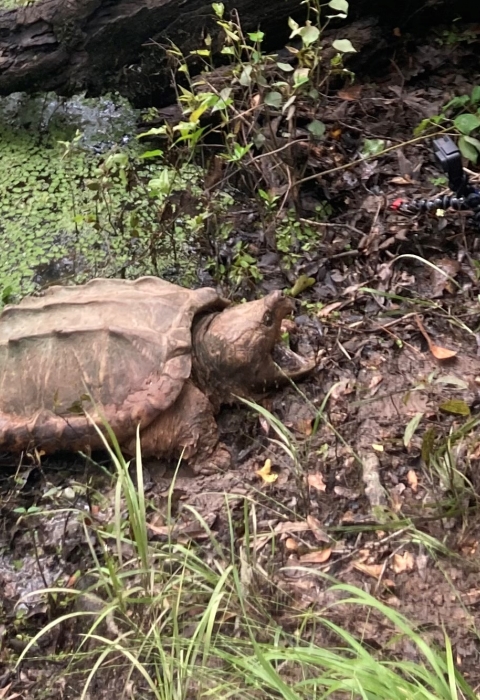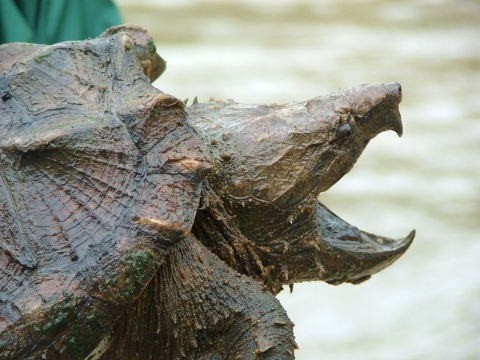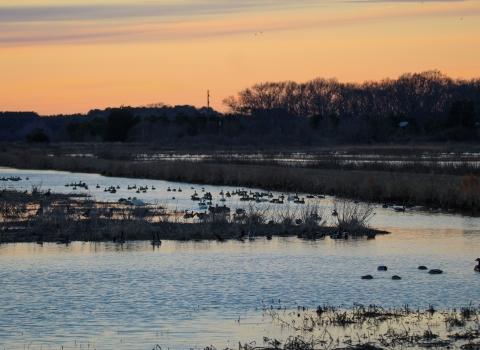The U.S. Fish and Wildlife Service has approved a Candidate Conservation Agreement with Assurances (CCAA) with the Trinity River Authority of Texas (TRA) to conserve six imperiled species. The 10-year agreement addresses the conservation needs of four species of freshwater mussels (Texas heelsplitter, Trinity pigtoe, Texas fawnsfoot and Louisiana pigtoe) and two species of turtles (western chicken turtle and alligator snapping turtle).
A CCAA is a formal, voluntary agreement between the Service and non-federal landowners to conserve at-risk species. Implementing proactive conservation efforts before species are listed as threatened or endangered under the Endangered Species Act (ESA) increases the likelihood that conservation efforts will succeed.
“Conservation is a mutual goal of the Service and its partners, and we believe the Trinity River Authority’s work and commitment here is significant,” said Jeff Fleming, the Service's Southwest Region Deputy Regional Director. “This CCAA will protect water resources for the benefit of a rapidly growing population, the environment, and sensitive fish and wildlife. The agreement promotes natural resource conservation while supporting important water supply operations in the Trinity River basin.”
“The TRA is excited to partner with the Service, the Cities of Dallas and Fort Worth, North Texas Municipal Water District, and the Tarrant Region Water District on this important conservation initiative,” said Kevin Ward, the General Manager of TRA. “This agreement will promote the conservation of aquatic species while ensuring water supply and wastewater operations continue to provide essential services in the Trinity River basin.”
The agreement provides incentives for at-risk species protection. In return for implementing the specified activities, the CCAA provides assurance that if a species becomes listed in the future, no additional conservation measures will be required without consent and the TRA will continue to meet the water needs for millions of residents of the Trinity River basin.
The CCAA provides participating landowners an “enhancement of survival” permit, authorizing incidental take of at-risk species during lawful activities. Take includes incidentally harming or killing a listed species which is prohibited under the ESA unless a permit is issued. Although incidental take is authorized as part of the CCAA, permit holders agree to make every effort to minimize harm to imperiled species, avoiding incidental take whenever possible.
The Trinity River basin is the largest river basin in Texas that both begins and ends in Texas. Not only does it provide water to over half of the human population of Texas, but the Trinity River basin is also critical for healthy fish, waterfowl, and other wildlife populations.
The Texas heelsplitter, Trinity pigtoe, Texas fawnsfoot and Louisiana pigtoe are freshwater mussels with historical ranges that include various portions of the Trinity River basin from its headwaters to the Gulf of Mexico. The Texas fawnsfoot was proposed for listing as threatened under the ESA in 2021, while the Texas heelsplitter was proposed for listing as endangered and the Louisiana pigtoe as threatened under the ESA on March 20, 2023. The Trinity pigtoe is not currently under review for listing under the ESA.
Freshwater mussels rely on good water quality, dependable flows, and intact riparian riparian
Definition of riparian habitat or riparian areas.
Learn more about riparian areas, making them excellent indicators of ecosystem health. Freshwater mussels obtain food by filtering water and tend to stay in the same general area unless they are disturbed by a force of nature or human activity. Threats to freshwater mussels include habitat loss, degraded water quality, increased sedimentation, and changes to the flows of rivers and streams due to diversions, impoundments, and development.
The western chicken turtle and alligator snapping turtle are freshwater turtle species that are in decline throughout their historical and current range, including within the Trinity River basin. Both can be found on land, although they mainly inhabit aquatic environments.
The alligator snapping turtle frequents ponds, lakes, and large rivers, while the western chicken turtle prefers slower-moving backwater areas, swamps, and ephemeral ponds. The alligator snapping turtle was proposed for listing as threatened under the ESA in 2021, and the western chicken is currently under review for potential listing under the ESA.
The adult alligator snapping turtle can live to be over 100 years and the western chicken turtle is relatively short-lived, with a maximum age of up to 24 years. Threats to freshwater turtles include habitat loss, habitat degradation, fishing bycatch and poaching for human consumption or as part of the illegal pet trade.
Besides conserving the six species in the CCAA, activities implemented in this agreement will also improve the water quality and natural flows of rivers for the benefit of rural and urban communities dependent on these water sources.
Conservation measures outlined for these species in the CCAA include monitoring water quality; detecting and preventing non-point source water pollution; implementing long-term monitoring to track species status; proactively protecting water flows and water quality; conducting research to help guide conservation; providing public education and outreach; and restoring and enhancing stream health through invasive aquatic plants control, reintroduction of covered species if needed, and the reduction of disturbances to occupied habitat.
One of the Service’s priorities is to make implementation of the ESA less complex, less contentious and more effective. We seek to accelerate recovery of threatened and endangered species across the nation, while making it easier for people and these species to coexist.
In addition to the recently signed agreement with TRA, the Service has finalized or is currently working on developing conservation agreements and plans with several other river authorities to benefit at-risk and imperiled mussel species in Texas, including the Brazos River Authority, Lower Colorado River Authority, Sabine River Authority and Guadalupe-Blanco River Authority.
Across the Southwest, 58 fish, wildlife and plant species have avoided ESA listing thanks to the collaborative efforts of federal agencies, states, Tribes and private landowners, with the ESA serving as a catalyst for conservation efforts that help protect at-risk species and their habitat.
To view the finalized CCAA and associated enhancement of survival permit, visit: https://www.fws.gov/library/collections/candidate-conservation-agreement-assurances-six-species-trinity-river-basin





